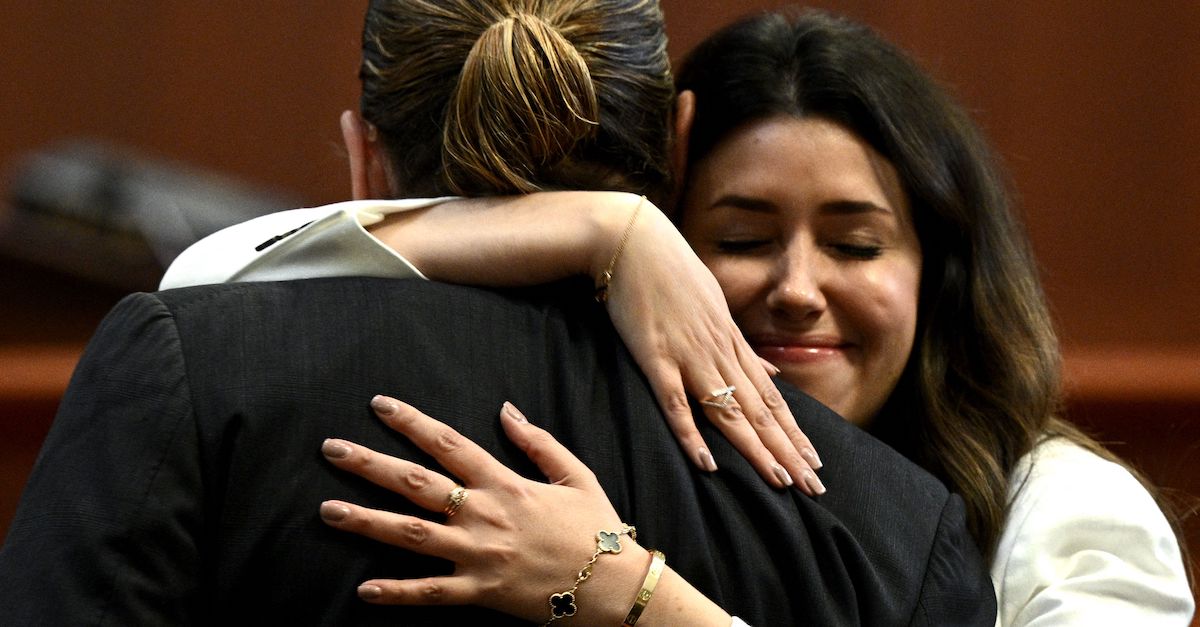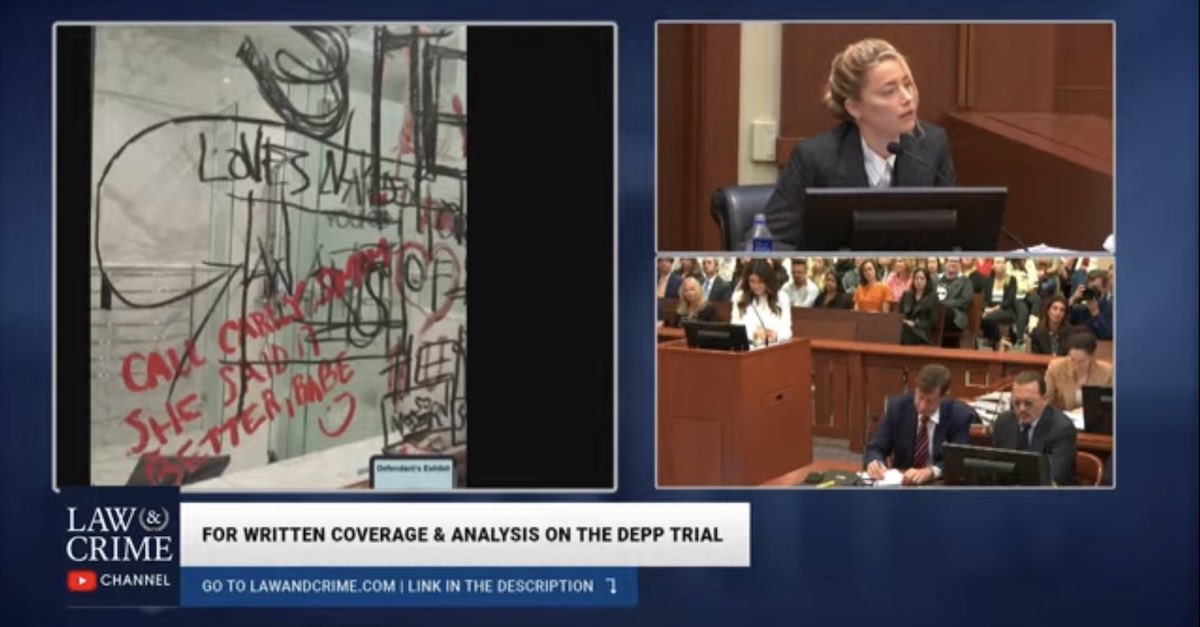
Attorney Camille Vasquez embraces US actor Johnny Depp in the courtroom at the Fairfax County Circuit Courthouse in Fairfax, Virginia, on May 17, 2022.
Late last summer, the legal publication Best Lawyers flagged Johnny Depp’s attorney Camille Vasquez among the “Ones to Watch” for 2022. Vasquez’s exposure then shot to the stratosphere during her pugnacious cross-examination of Amber Heard, watched by millions this week.
An associate at the Orange County office of the firm Brown Rudnick, Vasquez began her questioning earlier this week with heavy expectations. Heard had just finished emotional and often-tearful testimony about allegations of physical and sexual abuse that could only be described as horrific.
Recapping roughly a dozen alleged incidents, Heard gave testimony similar to her allegations that persuaded a U.K. judge that it was fair to call Depp a “wife-beater.” She claimed that Depp raped her with a liquor bottle, leaving her bleeding from her vagina. She said that Depp routinely slapped and punched her. More than once, Heard said that she thought she would die.
Then came Vasquez’s cross-examination.
“Mr. Depp Finally Told the World”
Nearly instantly, Vasquez landed an opening blow in her objective to recast the narrative of who was the abuser. She played a recording of Heard appearing to taunt Depp about whether the courts or the public would view him, “a man,” as a victim.
“Please tell people it was a fair fight, and see what the jury and judge will think,” Heard said on the tape. “Tell the world, Johnny. Tell them Johnny Depp, ‘I Johnny Depp, a man, am too a victim of domestic violence.’”
After pressing her about that tape, Vasquez pounced: “You’re here in this courtroom because Mr. Depp finally told the world that he is the victim of domestic violence.”
There is little public record to describe the California lawyer’s own journey to the small courthouse in Fairfax County, Va., where Depp and Heard’s dueling defamation claims have captivated the world. Vasquez’s bio on her firm’s website does not list any of her previous clients. Neither does what appears to be her LinkedIn page, which lists her as a graduate of Southwestern Law School in 2010.
The first gig listed on Vasquez’s online CV appeared seven years later as an attorney with Manatt, Phelps & Phillips, a Los Angeles-based firm that reported more than $316 million in revenue in 2017. Court records, however, show her working with that firm since as early as early as 2014.
Brown Rudnick, her current employer, is similarly a powerhouse listed among the American Lawyer’s top 200 firms in the United States.
Records from the Central District of California, the federal jurisdiction that includes Vasquez’s office, only shows her appearance in eight prior cases, largely contract, employer, labor or insurance disputes. None of those involved Hollywood megastars, and save for a subsidiary of AT&T, most of the parties were not well known. That cross-section of cases does not include other state and federal courts, and Depp’s publicists did not provide any more information to Law&Crime about Vasquez’s career for this article, citing the bustle of trial.
Thrust into the limelight, Vasquez became an icon to legions of the Pirates of the Caribbean actor’s supporters, who lit up social media with the hashtag #JusticeforJohnnyDepp. Many of Depp’s supporters view the defamation trial as a reckoning over what they view as the excesses the #MeToo movement, which was then about a year old when Heard wrote her Washington Post op-ed calling herself a survivor of domestic violence.
[embedded content]
Heard supporters cast Depp’s lawsuit as weaponized misogyny, allegedly re-victimizing a domestic abuse survivor through litigation that would harass, pathologize and humiliate her. Depp’s forensic psychologist diagnosed Heard as having borderline personality disorder and histrionic personality disorder, sparking a less delicate hashtag #AmberHeardIsaPsychopath. After Depp accused Heard of soiling their bed, another hashtag emerged: #AmberTurd. Heard denied the allegation, and a U.K. judge didn’t believe it, either.
“Kinda Like the Carly Simon Song”
READ RELATED: How To Murder Your Husband Writer Nancy Crampton Brophy Found Guilty of Murdering Husband – Motive Age And Children
As the woman at the center of the cultural debate, Vasquez walked a delicate line of zealously representing her client, tenaciously questioning every word of Heard’s testimony, and unraveling the forces that helped shape the media narrative.
For this trial, one of the most fateful forces was the American Civil Liberties Union, the more than 100-year-old rights group that helped write Heard’s op-ed and place it in the Washington Post in December 2018.
The group, traditionally associated with defending the due-process rights of the accused, has been sharply criticized for convicting Depp of a crime, for which he has never been charged—and doing it on behalf of someone whom they thought would be a major donor.
After her divorce with Depp became finalized, Heard vowed to donate her divorce settlement to the ACLU and Children’s Hospital Los Angeles, but Vasquez noted that she hasn’t yet fulfilled those obligations.
“Sitting here today, you have not donated the $7 million — donated, not pledged, donated — the $7 million divorce settlement to charity,” Vasquez said.
After Heard asserted that she viewed the words as “synonymous,” Vasquez shot back: “I don’t.”
Vasquez also did not flinch from the trial’s most disturbing allegations, interrogating Heard at length about her harrowing allegations of sexual assault in Australia in March 2015.
Heard claimed that was when Depp took eight to 10 pills of MDMA, smashed a wall-mounted phone to smithereens, sliced the tip of his finger off in the process and then held her down by the neck over the bar in one hand while grabbing a liquor bottle to penetrate her with another.
After Vasquez questioned the plausibility of that account, Heard replied: “I never testified to a sequence.”
Heard claimed that Depp trashed their Australian residence at the time, including by painting a mirror with black and red scrawl. To try to undermine the claim, Vasquez pointed to a message on the bottom left of the frame.

(Screenshot via Law&Crime Network)
“Call Carly Simon. She Said It Better, Babe,” read the red text in the mirror, followed by a smiley face.
Spelling out the apparent reference to “You’re So Vain,” Vasquez suggested that it was more likely to be Heard’s “snarky” handiwork. Heard said later in her testimony that the Post op-ed that Depp sued over was not really about him, but rather about the broader social issues.
“Kinda like the Carly Simon song, isn’t it, Ms. Heard,” Vasquez quipped.
It was the second time Vasquez brought out the feminist anthem to try to undermine the controversial #MeToo figure.
(Photo by BRENDAN SMIALOWSKI/POOL/AFP via Getty Images)
Have a tip we should know? [email protected]
Source:





